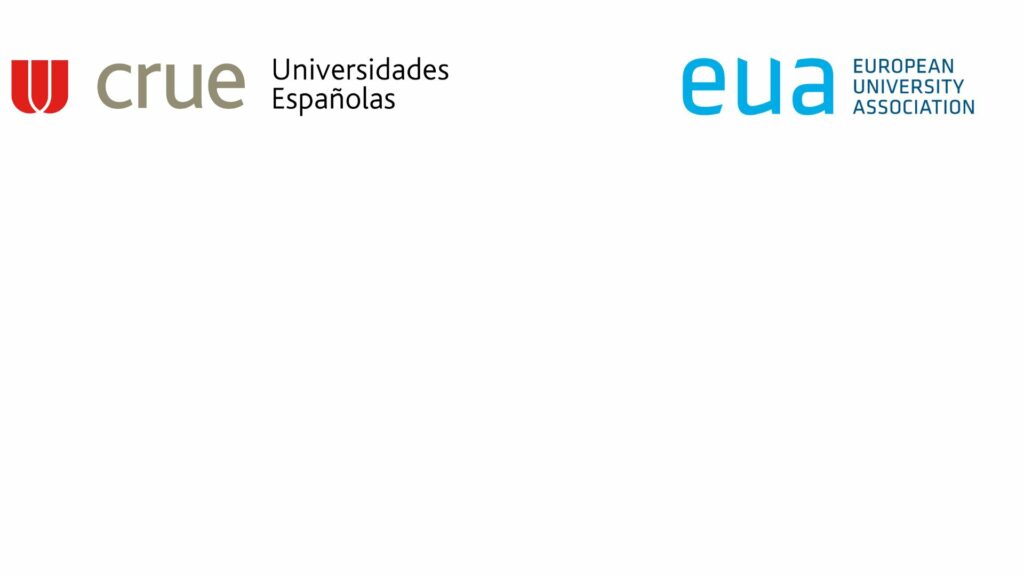Madrid, November 28, 2022. Crue Spanish Universities, in coordination with the European University Association (EUA), organized last Monday, November 28, the virtual Workshop ‘Perspectives on the reform of research evaluation in Spain’. The aim was to present the European Commission’s initiative for the reform of research assessmentl and invite to reflection on its relevance for Spanish universities. The meeting was inaugurated by José María Sanz Martínez, Executive Vice President of Crue Spanish Universities, and by Stephane Berghmans, Director of the Research and Innovation Unit of the European University Association (EUA).
Throughout the presentations, the speakers presented different aspects of interest about the initiative and the process. First, Senena Corbalán, Vice Rector for Research at the Universidad de Murcia, member of the Executive Committee of Crue’s Sectorial Commission for Research and Innovation and Crue’s representative in the EUA Research and Innovation Strategy Group (RISG), introduced the research assessment reform and its objectives in the national context. Corbalán highlighted the changes that have occurred in the research activity as a result of recent scientific advances and in the ‘great variety of ways of generating knowledge’. She pointed to the fact that these changes have resulted in a need to ‘inform and communicate about the results of research on very different ways than we were used to’. In addition, she highlighted the important impact that the way of evaluating research has on the scientific career and its development, and the relevance of the initiative promoted by the European Commission to promote this reflection.
Stephane Berghmans, Director of the Research and Innovation Unit, and Rita Morais, Adviser for Research and Innovation, presented the key points of the Agreement on Reforming Research Assessment, published on July 20 following an intense consultation process with multiple stakeholders of the European research system promoted and facilitated by the European Commission since January 2022. This Agreement establishes a shared direction and a common framework for changes in research evaluation practices, research staff, and organizations and institutions conducting research, in order to maximize its quality and impact.
The agreement includes the commitments and deadlines for the reforms and establishes the principles and framework for the creation of a Coalition on Advancing Research Assessment (CoARA). Berghmans and Morais stressed that this coalition intends to serve as a platform for piloting and experimentation, as well as for the development of new evaluation criteria, methods, and tools that will result from joint reflection and the exchange of good practices. To this end, it hopes that the Coalition will bring together universities, university associations, public and private research funding bodies, research centers and institutes, associations and alliances, national and regional authorities, accreditation and evaluation agencies, scientific societies or associations of researchers, among others.
At the time when the Workshop was organized So far, they reported that 426 organizations have joined the CoARA, of which 271 (63%) are universities or university associations.

Regarding the distribution of organizations adhering to the Coalition by country, Spain is in third place with 44 signatory organizations, of which 31 are Spanish universities.

Finally, regarding the data of the European university sector, the EUA reported that, at the time of this Workshop, a total of 9 National Rectors’ Conferences had joined the CoARA Coalition so far, including Crue Spanish Universities, 253 universities and another 9 European university networks, reaching a total of 271 universities or university associations.
Pastora Martínez Samper, Vice Rector for Globalization and Cooperation at the Universitat Oberta de Catalunya and Crue’s representative in the EUA Expert Group on Open Science (EGOS), highlighted the importance of the participation of universities in the Coalition and in the research assessment reform process. She stressed that this would allow to ensure that the opinion and interests of the university sector are considered and adequately collected. In addition, she added that it is an opportunity for mutual learning.
At the end of the session, Stephane Berghmans acknowledged that there are many challenges ahead, not only in Spain but also in other European countries, and recalled that ‘the alternative is that we do nothing and that everything stays the same’. He considered that joining CoARA ‘is the only way that, in our systems, we move towards an evaluation model that may not be perfect, but that will be more like what universities want.’
For his part, José María Sanz Martínez thanked the representatives of the EUA for the excellent collaboration between both associations and recalled that Crue Spanish Universities has closely followed the process since January 2022. He stressed that ‘we have the opportunity to participate in a process that has a final objective to which we can contribute, in a way that adapts to the national reality and to the fields of knowledge, as active agents of the process.’ In this sense, he reported that Crue has signed the Agreement and has joined CoARA with the aim of continuing to provide service to its member universities and to continue reporting on progress in the process.
Finally, Sanz announced that Crue Universidades Españolas will inform its member universities about the launch of a national forum for the reform of research assessment that it will coordinate together with the Ministry of Universities and whose launch is scheduled for January 2023.


